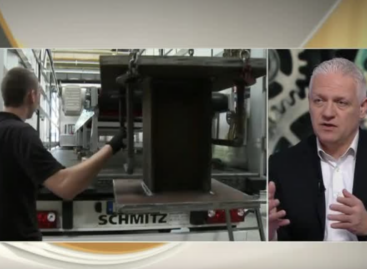Changes can’t be delayed any more
Our magazine interviewed László Krisán, the CEO of KAVOSZ Zrt.

![]() How did different types of enterprises performed in 2020?
How did different types of enterprises performed in 2020?

László Krisán
CEO
KAVOSZ
– 2020 was a rollercoaster ride because of the pandemic and the economic crisis it generated. IT and the pharmaceutical industry are booming, the food industry and retail trade are doing well, but hospitality, tourism and entertainment basically collapsed.
![]() Did the total number of businesses increase or decrease?
Did the total number of businesses increase or decrease?
– I would say the number is the same as before, but the building and construction sector expanded by approximately 5 percent. My earlier prediction that the pandemic will entail acquisitions and a wave of new owners didn’t prove to be correct as much as I thought.
![]() How did companies in the FMCG sector perform in 2020?
How did companies in the FMCG sector perform in 2020?
– Consumer activity reduced the least in grocery retail, but spending dropped in other sectors as people were trying to save money. The pandemic made the biggest impact on the digital channels – it is enough to mention the conquest of home delivery and contactless payment. As for the changes in consumption trends, those retailers could be winners who reacted swiftly to these new trends.
![]() What about the level of employment?
What about the level of employment?
– In the years before the crisis the biggest problem was the labour shortage and the cost of workforce. During the past year many people who used to work in tourism and hospitality were forced to find work in other sectors, and I don’t think they will ever return to their old jobs. My view is that the low level of unemployment will return soon.
![]() Were new regulations introduced that had an effect on the lives of enterprises?
Were new regulations introduced that had an effect on the lives of enterprises?
– Yes, there were many. The majority of new rules had an influence on the lives of businesses. Some of these were introduced to improve the economic situation, while others were trying to protect people from the pandemic – and actually working against the interests of enterprises.
![]() How did KAVOSZ react to the new situation with the Széchenyi Card Programme?
How did KAVOSZ react to the new situation with the Széchenyi Card Programme?
– We were among the first to react to the new conditions: already after the lockdown was announced on 16 March, we set up working groups to deal with the most important issues. In mid-April – in partnership with the Ministry of Agriculture – we came out with the Agricultural Széchenyi Card Plus, and a few weeks later with support from the Ministry for Innovation and Technology the other first-round crisis packages were launched.
![]() In what other ways do you represent the interests of companies?
In what other ways do you represent the interests of companies?
– We meet the representatives of 300-400 enterprises a day and based on their opinions and needs, we make recommendations to the authorities. KAVOSZ and its Széchenyi Card Programme serves as a kind of information and feedback system for decision-makers.
![]() How big is the damage that the coronavirus caused in the last twelve months and what can we expect in the months to come?
How big is the damage that the coronavirus caused in the last twelve months and what can we expect in the months to come?
– In 2020 the level of investment dropped 4 percent and the number of employed people reduced by minimum 500,000. The volume of retail didn’t really change in comparison with 2019, but the trends in different product categories did. Probably the hardest period is already behind us, but many things will change with the reopening, e.g. the elements of the global supply chain, the labour market, etc. It will be inevitable to implement development projects after the pandemic, we can’t make the same mistake again as in 2008, when after the recession ended nobody did anything.
![]() How are Hungarian enterprises changing?
How are Hungarian enterprises changing?
– The big question is whether companies and individual understand the essence of the current crisis. If the answer is yes, will they be able to draw the right conclusions and make the necessary changes? Everyone had a year to develop a strategy for the years ahead of us. Those voices are becoming louder that say: economic sovereignty is crucial and this requires creating the right operating conditions for Hungarian enterprises. //
Related news
NGM State Secretary: Interest in fixed 3 percent SME loans is greater than expected
🎧 Hallgasd a cikket: Lejátszás Szünet Folytatás Leállítás Nyelv: Auto…
Read more >“Businesses want to survive and grow”
🎧 Hallgasd a cikket: Lejátszás Szünet Folytatás Leállítás Nyelv: Auto…
Read more >Related news
The Store of the Future opens again at the SIRHA Budapest exhibition! (Part 1)
🎧 Hallgasd a cikket: Lejátszás Szünet Folytatás Leállítás Nyelv: Auto…
Read more >The impact of the forint exchange rate on GDP growth
🎧 Hallgasd a cikket: Lejátszás Szünet Folytatás Leállítás Nyelv: Auto…
Read more >







